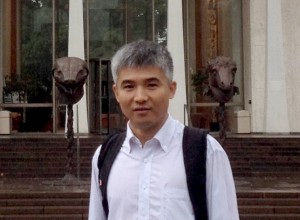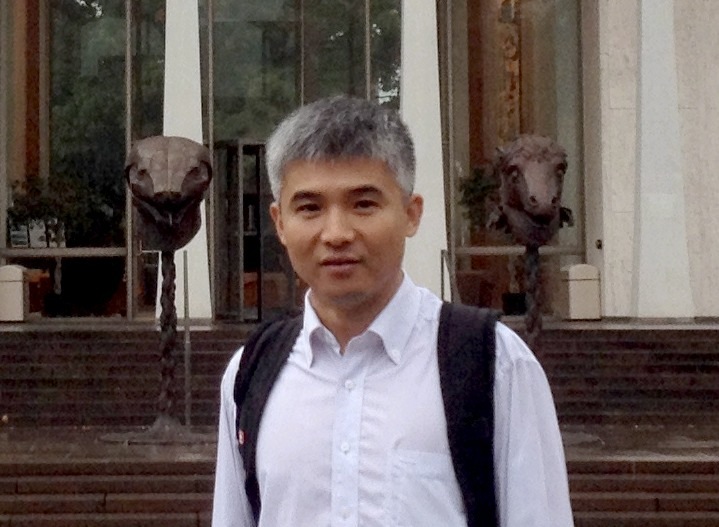
In 2005, Southern Weekend named Lu Jun one of the “Top Ten People of the Year.” He is currently a visiting fellow at the New York University U.S. Asia Law Institute. I recently asked Lu to share his insights into running an NGO in China, the current status of civil society given the recent tightening, the proposed Foreign NGO Management Law, and the recent detentions of lawyers and rights activists. Most of his answers have been translated from Chinese.
China Digital Times: Can you tell us about the background of Yirenping? Why did you first start the organization? What did you hope to achieve? Would you say that so far the organization has been successful in achieving or working towards achieving those goals?
Lu Jun: Yirenping was registered in December 2006 as China’s first NGO with an “anti-discrimination” mission. At that time, I had already been doing volunteer work to fight discrimination against Hepatitis B [carriers] for three years. I came to feel strongly that this kind of anti-discrimination work is very important for vulnerable groups, but at that time there weren’t any domestic groups specifically working in this field. Three friends and I all felt that China needed an organization specializing in anti-discrimination work, so we registered the Beijing Yirenping Center to focus on anti-discrimination, as well as public health and other human rights issues.
At the time that we registered, we expected to push forward the elimination of institutional discrimination against China’s nearly 100 million Hepatitis B carriers, as well as discrimination against those with HIV and others within the realm of public health.
Through a great amount of effort from 2007 to 2009, we together with members of the community successfully pushed official legislative and administrative bodies to eliminate institutional discrimination against Hepatitis B carriers. Twenty pieces of legislation were modified and many new laws were passed. This meant that the nearly 100 million Hepatitis B carriers no longer faced discrimination in employment or education. Suicide and revenge killings by Hepatitis B carriers and other phenomena that occurred frequently in the past were greatly reduced. My colleagues and I all felt our work was very successful, and China’s NGO and legal communities generally feel the same.
CDT: From the beginning, what has Yirenping’s relationship with the authorities been like? Did you face any difficulties in registering the group? The organization is registered as a business, not as a non-profit. Could you explain why you and your co-founders chose that route? In what ways has that benefited or hindered your work?
LJ: Before 2014, our relationship with the government was better than we had first expected. At the time, domestics AIDS rights and advocacy organizations were frequently harassed by authorities, and their meetings and trainings were shut down and their leaders were “disappeared.” After Yirenping was founded, even though we received “attention” from several different government departments and different levels of police, until summer 2014 our meetings and trainings had never been shut down, and our staff had never been “disappeared” or detained. Moreover, police at all levels had never accused Yirenping of violating the law and generally agreed that Yirenping’s work was meaningful.
We asked the police and the Civil Affairs Department if we could register as a social organization or a private non-enterprise organization, but the answer was always no. In recent years, although the Civil Affairs Department has broadened the registrations of “private non-enterprise” organizations, this broadening does not apply to legal rights defense or policy advocacy groups.
As for the differences between registering as a company or as a civil organization, I actually am not too clear myself, because I don’t understand the civil administration registration of organizations. The following are some areas where registration as a company may be less advantageous than registering as a civil organization:
- When government departments buy services from NGOs, they often require the NGO to be registered as a civil organization.
- The are strict restrictions on receiving foreign currency.
- We cannot apply for tax exemptions.
CDT: I have read that over the years Yirenping has had trouble accessing donations from foreign groups due to regulations that prohibit overseas contributions. Yet much of your fundraising must by necessity come from overseas. How have you worked around these regulations?
LJ: In 2010, the central government imposed a new regulation strictly limiting the acceptance of foreign currency. But Chinese NGOs found another method which requires them to pay additional taxes to the government, at a rate of three to five and a half percent.
CDT: How much of your fundraising comes from within China? Has that number grown at all in recent years?
LJ: Less than ten percent of our funds come from within China. In recent years, the number has not grown, but has in fact decreased. The most important reason is that as our work has gotten positive results, our international reputation has grown and more international programs cooperate with us.
CDT: With the detention of the so-called Feminist Five in March 2015, there was speculation that those five feminist activists had been targeted because they had some connection with Yirenping. During their detention, Yirenping offices were raided, and two more activists associated with the group have since been detained. Do you believe Yirenping is being singled out by authorities, and if so, why?
LJ: The real reason for the detention of the five feminist activists is still unclear. Maybe it is that they wanted to strike Yirenping, but not necessarily, since two of the detained women had not worked with Yirenping before.
I believe that Yirenping is not the only target of the official crackdown on NGOs, as other NGOs have also been suppressed:
- On September 18, 2014, the renowned nonprofit China Rural Library announced it would cease operations.
- On October 9 and 10, 2014, the founder, leaders, and staff of the well-known think tank Transition Institute were detained and their offices were raided.
- In January 2015, a British national linked to an international nonprofit was forced to leave China due to visa issues that were raised by the police. According to media reports from March 2015, a French national connected to Chinese civil groups was detained for ten days for similar reasons, and then also forced to leave China.
In addition, the drafting of the Foreign NGO Management Law shows more clearly that the official crackdown on NGOs is holistic. Yirenping is a relatively large and well-established legal rights defense and policy advocacy NGO, so it is not unusual that we are being suppressed.
CDT: We have been hearing a lot in the international press about a “crackdown” on civil society in China under Xi Jinping, and many people in China and abroad have raised grave concerns over the draft foreign NGO management law. Yet just a year ago, the Economist ran an article about how despite the political clampdown, civil society groups in China are “flourishing” while also being subjected to inconsistent and unpredictable treatment by authorities. How would you evaluate the status of civil society in China today? How has the sector as a whole changed since you first started Yirenping in 2006?
LJ: One year ago, I was relatively optimistic about the plight of Chinese NGOs, because the social contradictions in China were too sharp, the number of rights activists was increasing, and many people were more “sensitive” than NGOs. So the degree of sensitivity of NGOs was decreasing. In the spring of 2011, during the North African and Middle East “Jasmine Revolutions,” several hundred rights lawyers and activists “disappeared,” but none of them were NGO workers, which showed that authorities did not consider NGOs a “revolutionary” threat. For the next three years, the official pressure on NGOs was clearly less than before 2011.
The situation began to change in the summer of 2014, starting with pressure on the Zhengzhou Yirenping Center. The situation has continued to develop to today, when we can see that the government’s attitude toward NGOs has become much more hostile than it was between 2011 and 2013. The level of hostility far surpasses that of a decade ago during the “color revolutions” in Eastern Europe and Central Asia, and it also surpasses the period during the 2008 Olympics and the 2009 60th anniversary of the founding of the PRC, and even more so the period when Yirenping was founded in 2006 and 2007. Many people in the NGO community think that this hostility is in following with Russia.
CDT: During the public consultation process for the Foreign NGO Management Law, many individuals and groups both inside China and abroad issued detailed critiques and feedback. Most of the criticism focused on the overly vague and broad definitions in the law. How valuable do you think the public consultation process will be? Have you seen any indication that those tasked with drafting the law will take the critiques into consideration?
LJ: The suggestions received on the draft of the law seem to have gone far beyond the scope imagined by the drafters (the Public Security Bureau) and reviewers (the National People’s Congress Standing Committee). From reading the comments and suggestions that have been made public, if the current draft is ratified, it will greatly damage international cooperation with China as well as the policy of “opening” to the world.
CDT: If the Foreign NGO Management Law passes as currently drafted, what would you expect the impact to be on Yirenping and other similar groups?
LJ: The influence on Yirenping and other rights advocacy groups would not be too big, because these groups have already long been subject to strict monitoring from the public security, state security, and civil affairs bureaus, and the space for their activities is already very limited. In addition, they have ceaselessly been subjected to all methods of search, investigation, and penalties from the taxation, industry and commerce, and public security departments. Adding one more law would be a drop in the ocean.
The environment for Chinese NGOs was never the same as in countries like Russia, Egypt, or India. Those countries all have multi-party political systems, and political parties have the freedom to organize. “Freedom of association” receives widespread attention, and civil organizations have considerable space. Compared to those international NGOs, the restrictions that Chinese rights defense and advocacy NGOs have faced for so long are much harsher. One more law will not make us helpless.
CDT: I know it is early yet, but what is your initial reaction about why the government took the action last week of detaining more than one hundred lawyers and activists, on so-called “Black Friday”? And what do you think the government’s motivation or desired outcome is?
LJ: My point of view is, the direct reason for the police’s action could be the police shooting case in Qing’an.
Wu Gan posted a video on social media which was quite different from CCTV’s video of the shooting, and then he was detained. Wang Yu went to the detention center to see Wu Gan and posted about police harassment and obstacles to the visit, and then Wang Yu disappeared together with her husband and 16 year-old son. Both Wu Gan and Wang Yu work for Zhou Shifeng’s law firm, so Zhou Shifeng was detained afterwards, together with some other lawyers from the law firm.
More than 100 lawyers posted a petition against Wang Yu’s disappearance, and then police launched an action to round up more than 100 lawyers.
The reason for the police authority’s crackdown in the Qing’an case is police are expanding their power. The authorities are encouraging police to “dare to shoot” by confirming the police shooting in the Qing’an case. Other phenomena include the police role in the proposed Foreign NGO Management Law and police involvement in the stock market.
=================
Read more about civil society in China and about Yirenping, via CDT.








